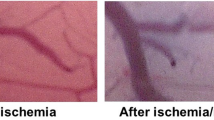Summary.
Increased sympathetic tone is a consequence of cerebral ischemia. Although the role of catecholamines in ischemic damage is still unclear, in some experimental ischemia models α2-adrenergic agonism has proved to be neuroprotective. In the present work we have compared the effects of transient and permanent middle cerebral artery occlusion (MCAO) on the infarct volume, and, also, examined whether a selective α2-adrenergic receptor agonist, dexmedetomidine (9 μg/kg or 15 μg/kg i.v.), is able to reduce ischemic damage after transient or permanent MCAO in rats. Permanent MCAO led to a significantly larger infarct volume than transient occlusion (p < 0.05). The rats receiving the higher dose of dexmedetomidine were detectected to have smaller (statistically non-significant) infarct volume in the cortex (30.9%) and in the striatum (20.3%) after transient occlusion. Additionally, dexmedetomidine caused significant variations in the physiological parameters.
Similar content being viewed by others
Author information
Authors and Affiliations
Additional information
Received December 22, 1999; accepted September 20, 2000
Rights and permissions
About this article
Cite this article
Kuhmonen, J., Haapalinna, A. & Sivenius, J. Effects of dexmedetomidine after transient and permanent occlusion of the middle cerebral artery in the rat. J Neural Transm 108, 261–271 (2001). https://doi.org/10.1007/s007020170071
Issue Date:
DOI: https://doi.org/10.1007/s007020170071




